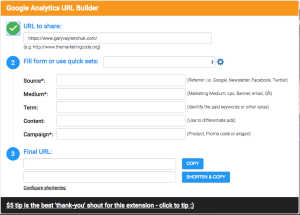What the fu#< is a UTM (Parameter)?
No, it’s not a pokemon or some weird STD.
It’s one of the easiest ways to track your digital marketing. Brought to you by Skynet… I mean Google. [cough]
How to Use UTM Parameters
When you’re marketing your brand, UTM Parameters help answer these questions:
- Where did my conversions or traffic come from?
- Is that ad worth the money I’m spending on it?
- What do people that come from my banner ad actually do when they come to my site? [compared to my organic leads]
- How many conversions came from my twitter profile this week?
- And more..
I’ve got a business to run and Narcos to devour, why should I learn something completely new?
Great question, bro.
Read on.
What’s the use of UTM Parameters?
This is Kaci.

Last week she launched her brand new portfolio website and is excited to generate intentional traffic to her key pages:
• Her “about me.”
• An impressive gallery of her images.
• Her contact us page.
• The unbounce landing pages she is using to promote her fashion show.
Kaci has worked with a digital marketer in the past and she has a bit of knowledge on how to brainstorm campaigns and tools she can use to spread the word. She’s tech literate: tools like Facebook interest targeting, Twitter’s keyword targeting, and Google Analytics have helped her create leads in the past. While she isn’t planning on switching careers, she understands that this is the new economy: she can market her own brand without being a big company herself.
She can play in the big girls yard, without having a big budget.
She is active in her local communities, and has deep relationships with leaders of other tribes.
As part of her marketing strategy, she is driving traffic to multiple sites she knows her target market visits.
Keep Kaci in mind as we look at the anatomy of a UTM Parameter together.
Google Analytics is Not Always Ideal Straight Out the Box
Remember back when advertisers all had deep pockets and based success of their ad campaigns on, mostly, mass targeted impressions?
Think TV, billboards, radio.
Scratch that noise because it’s 2016. You can advertise on the interwebs and use a free tool called Google Analytics to- straight out the box- be able to see:
- What your most popular content pages are.
- Where visitors go once they arrive on your site.
- Why people are arriving on a specific landing page and completely bouncing to another website, so you can fix it.
With a few tweaks, you can even see things like the amount of phone calls your ad produced, and which one.
Here is a sample UTM Parameter for Kaci:
https://kacithemodel.com?utm_source=yogamodelcommunity&utm_medium=banner&utm_content=upcomingshow&utm_campaign=beflawless
Take note of the
- Different “utm” sections.
- Source, medium, content, campaign
UTM Parameter Breakdown
Lets break it down.
Would knowing whether a lead or conversion came from a Facebook Ad or an organic social post be useful to you? Of course it would! If your ad isn’t working and it costs you $500 dollars a month, just imagine what you could be doing with that money.
You won’t know if you aren’t tracking.
May as well throw that $500 out the window.
The Easiest Way to Build UTM Parameters
There’s an app for that.
Actually, a chrome extension. The Google Analytics URL Builder.
Use the URL Builder. Watch the video first:
—-
Links to additional resources:
How To Use UTM Parameters In Google Analytics 5: How To Use UTM Parameters In Google Analytics 5
I Bet You Haven’t Used UTM Parameters Like This Before
I also recommend using UTM Parameters together with goals.
Google Analytics Goals Can Make / Save You Money
—-
Happy creating to you!
If you have any tips or awesome resources to share, please do it in the comments, fellow digital-ninjas.


Comments are closed.